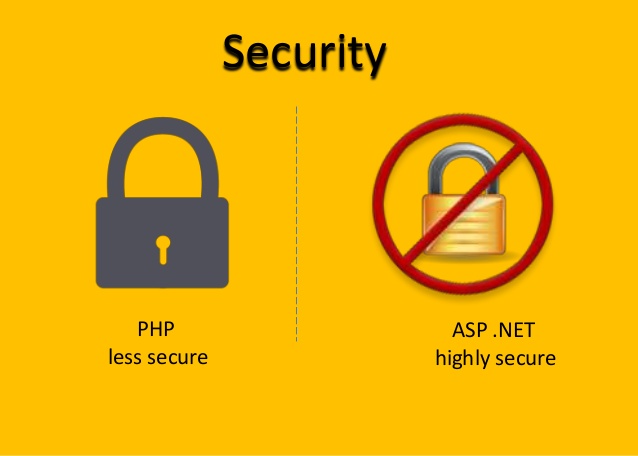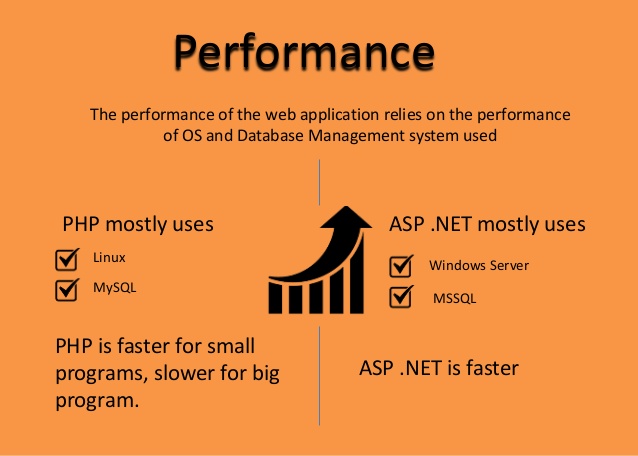ASP.NET vs PHP


PHP
Introduction: - PHP is a server-side scripting language designed for web development but also used as a general-purpose Programming language. PHP code can be simply mixed with HTML code, or it can be used in combination with various templating engines and web framework.
Advantages
- Easy to learn (Short learning curve)
- Large community of users and developers
- Provides extensive database support
- Offers great number of available extensions and source codes
- Allows execution of code in restricted environments
- Offers native session management and extension API
- A great alternative for competitors like Microsoft’s ASP (Active Server Pages)
- Can be deployed on most web servers
- Works on almost every operating system and platform
Limitations
- Not suitable for making desktop applications
- Error handling is traditionally poor
- Global configuration parameters can change language semantics, complicating deployment, and portability
- Objects are CallByValue by default, which is the opposite of most languages and catches lots of programmes off-guard
- Generally considered to be less secure than the other programming languages
Who uses it?
ASP.NET
ASP.NET
Introduction: -ASP.NET is an open-source server-side Web application framework designed for Web development to produce dynamic Web pages. It was developed by Microsoft to allow programmers to build dynamic websites, web applications and web services. ASP.NET is built on the Common Language Runtime (CLR), allowing programmers to write ASP.NET code using any supported .NET language. The ASP.NET SOAP extension framework allows ASP.NET components to process SOAP messages.
Advantages
- NET drastically reduces the amount of code required to build large applications.
- With built-in Windows authentication and per-application configuration, your applications are safe and secured.
- It provides better performance by taking advantage of early binding, just-in-time compilation, native optimization, and caching services right out of the box.
- The ASP.NET framework is complemented by a rich toolbox and designer in the Visual Studio integrated development environment. WYSIWYG editing, drag-and-drop server controls, and automatic deployment are just a few of the features this powerful tool provides.
- Provides simplicity as ASP.NET makes it easy to perform common tasks, from simple form submission and client authentication to deployment and site configuration.
- The source code and HTML are together, therefore, ASP.NET pages are easy to maintain and write. Also, the source code is executed on the server. This provides a lot of power and flexibility to the web pages.
- All the processes are closely monitored and managed by the ASP.NET runtime, so that if a process is dead, a new process can be created in its place, which helps keep your application constantly available to handle requests.
- It is purely server-side technology so, ASP.NET code executes on the server before it is sent to the browser.
- Being language-independent, it allows you to choose the language that best applies to your application or partition your application across many languages.
- NET makes for easy deployment. There is no need to register components because the configuration information is built-in.
- The Web server continuously monitors the pages, components, and applications running on it. If it notices any memory leaks, infinite loops, other illegal activities, it immediately destroys those activities and restarts itself.
- Easily works with ADO.NET using data-binding and page formatting features. It is an application which runs faster and counters large volumes of users without having performance problems
Limitations
- Mixes layout (HTML) and logic (scripting code)
- Interpreted and Loosely-Typed Code
- Limited Development and Debugging Tools
- No real state management
- Update files only when server is down
- Obscure Configuration Settings
Who uses it?
Our Dotnet Trainers
- More than 11 Years of experience in MS Technologies
- Working experience on All Framworks from ASP 3.0 to 4.5
- Has worked on multiple realtime dot net projects
- Experience of Working in MNC companies
- Experience of Working with Global Clients
- Good Teaching and Training experience
- Strong Theoretical & Practical Knowledge
- Microsoft certified Professionals
Training Facilities


